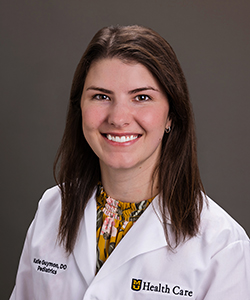January 29, 2024

Parents naturally worry about their child’s development. But when nagging concerns won’t go away, there may be a reason. Many times, it’s parental concerns and observations that lead to earlier diagnosis of autism spectrum disorder (ASD) — a developmental condition affecting behavior and social communication.

“When a child has autism, their brain functions differently,” says Dr. Kathryn Guymon, an MU Health Care pediatrician. “It impacts how they process information and interact with the world.”
Dr. Guymon, who is trained through the ECHO (Extension for Community Health Outcomes) Autism STAT (screening tool for autism in toddlers) program, knows that the earlier a child receives an ASD diagnosis, the sooner they’ll have access to the resources and support that they need. But an autism diagnosis is rarely cut and dry — it’s easy for parents to miss early signs, and one symptom of autism doesn’t mean the child is on the spectrum.
If you suspect your child has ASD, you may be wondering what your next steps are and whether to get your child tested. Dr. Guymon provides the essential information that you should consider:
1. Age Doesn’t Dictate When Autism “Starts”
One thing parents may not know is that there isn’t actually a “start” to ASD — kids are born with it. But that doesn’t mean it gets diagnosed at birth. ASD doesn’t follow a predetermined playbook — the first signs may become noticeable at various ages depending on:
- Gender: Girls often mask their socialization difficulties more than boys
- Level of socialization: ASD symptoms often become more apparent in social situations
- Severity of the disorder: Symptoms of mild ASD may go unnoticed for longer
“Some kids show signs of autism whether they’re with their parents or unfamiliar people,” Dr. Guymon says. “But when young kids seem comfortable with parents and family, they may not show obvious signs, making it difficult to see a social skills deficit.”
Trained medical professionals can diagnose some children with ASD as early as 12 months of age if the signs are apparent. But the average age of ASD diagnosis is 4 years old. By the age of 8, one in 36 children is diagnosed with ASD.
“Most concerns come from parents during the toddler years,” Dr. Guymon says. “Some people don’t notice symptoms until the school years, but that’s more likely to happen if the child is an only child, wasn't in daycare or didn't have a lot of exposure to other kids.”
2. Children Must Have Multiple Signs of Autism for Diagnosis
The most common reason parents seek screening or evaluation for ASD is hand flapping or other repetitive movements, says Dr. Guymon. But that isn’t the only sign of autism, and it isn’t enough to warrant a diagnosis.
“You have to look at the big picture when evaluating behavior for ASD,” Dr. Guymon says. “Kids must meet very specific criteria to receive an ASD diagnosis — there must be deficits in social communication and restricted repetitive behaviors. It’s not one or the other.”
Social signs of autism
Children with ASD struggle with social communication and interaction and may have difficulty:
- Making or holding eye contact
- Noticing the emotions of others
- Pretending and playing make-believe with others
- Sharing interests with others
- Showing facial expressions
- Using hand gestures to communicate
Restricted or repetitive behaviors associated with ASD
Children with ASD demonstrate some behaviors or interests that seem unusual, such as:
- Flapping hands or rocking their body
- Lining up toys or just carrying them around without actually playing with them
- Obsessive interests
- Overreacting when things are out of order or a routine changes
- Repeating words or phrases (echolalia)
- Sensory issues and dramatic reactions to certain sounds, smells, tastes or textures
3. Pediatricians Are the First Step in Diagnosing Autism in Children
As experts in child development, pediatricians play a critical role in diagnosing ASD. They conduct developmental and behavioral screening during well-child visits at 9, 18 and 30 months. They also specifically screen for ASD at 18- and 24-month checkups.
“Your child’s checkup is the perfect time to voice your concerns or relay what you see,” Dr. Guymon says. “Not every general pediatrician is well-versed in autism, but they should all be knowledgeable about normal developmental patterns, and they should know your child well.”
Some pediatricians are highly trained and able to diagnose some cases of ASD. One study of 20 children who received an ASD diagnosis from a trained primary care doctor found that 19 of those diagnoses were confirmed by a gold-standard evaluation. If your pediatrician is not trained to diagnose ASD, they can connect you with specialists who are.
4. Diagnosing Autism Can Be a Lengthy Process
If screening reveals signs of ASD, your doctor may refer your child for a formal evaluation. The specialists who may perform a developmental diagnosis include:
- Child psychologist
- Developmental pediatrician
- Occupational therapist
- Speech-language pathologist
“Developmental specialists will look at your child’s history.” Dr. Guymon says. “They will conduct a diagnostic interview and utilize play-based behavioral observations.” But these evaluations can take time. The average time from the first discussion with your pediatrician about your concerns to an ASD diagnosis can be two years or more.
“Never wait to bring up your concerns,” Dr. Guymon says. “If worries about your child’s behavior repeatedly cross your mind or have come up multiple times, don’t hesitate to say something and get the process started.”
5. A Diagnosis Provides Resources for Children With Autism
If your child has ASD, an earlier diagnosis provides access to resources and therapies that can have long-term benefits for your child and family. Earlier intervention is linked with improved daily living skills, social behavior and quality of life over time.
“An autism diagnosis opens doors to many resources specifically designed for kids with autism,” Dr. Guymon says. Those resources may include:
- Applied Behavior Analysis therapy: This therapy helps children with social skills, daily functioning and adapting to different social environments.
- Care coordination: You’ll work with someone who looks at all aspects of your child’s care to determine what therapies, social support and school resources they need.
- Insurance coverage: An ASD diagnosis may help secure coverage for social support groups and other miscellaneous expenses in addition to therapy.
“No two kids on the spectrum are the same, even if they have similar needs,” Dr. Guymon says. “With an ASD diagnosis, you’ll have resources to help you personalize your child’s care.”
Next Steps and Useful Resources
- Want to discuss more with a pediatrician? Find one today.

